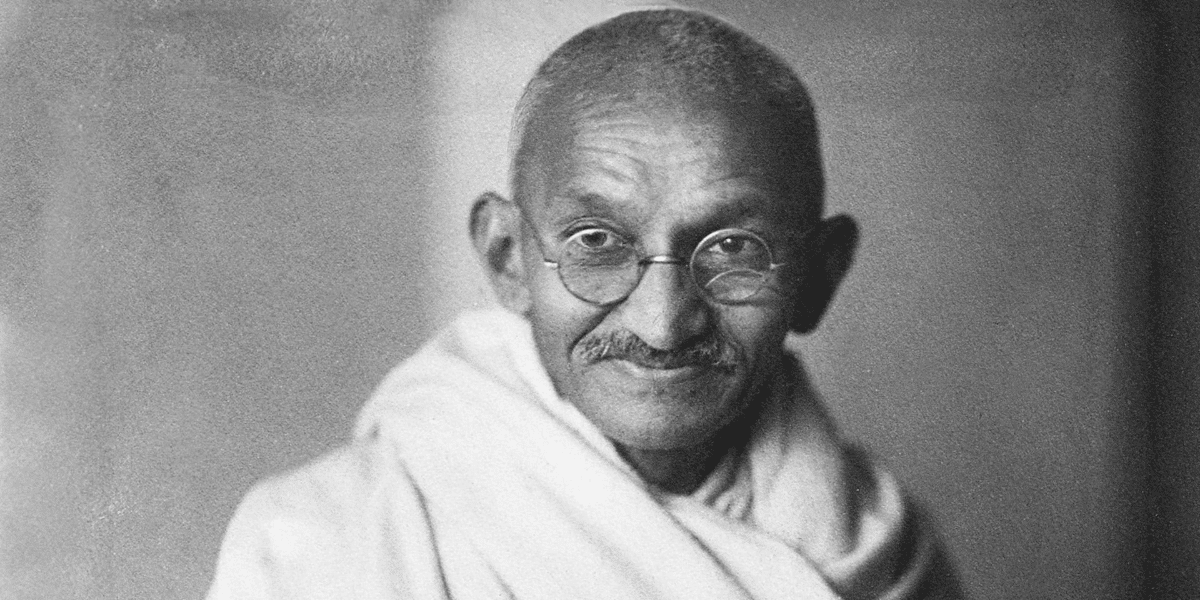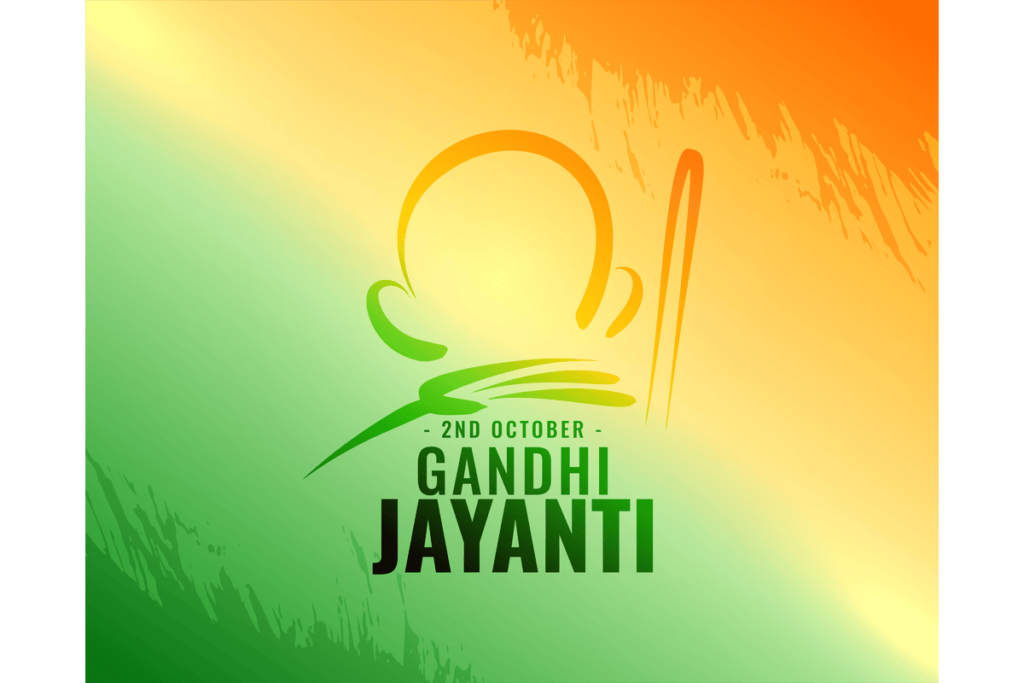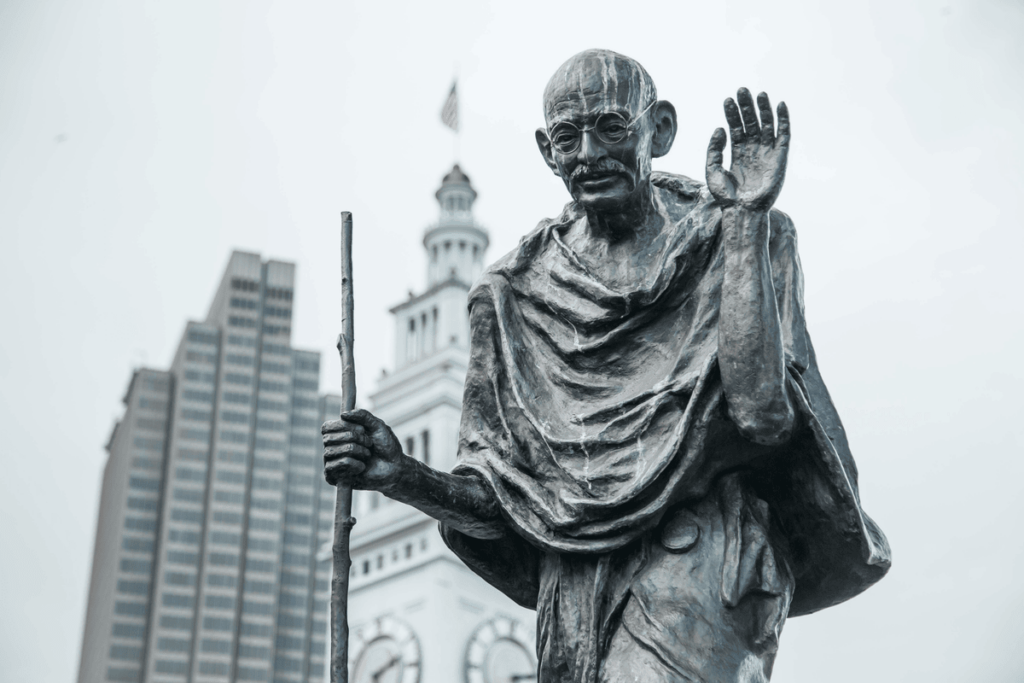
Quick Summary
Table of Contents
Mahatma Gandhi Jayanti, celebrated every year on October 2, is a national holiday in India honoring the birth anniversary of Mohandas Karamchand Gandhi, widely revered as the “Father of the Nation.” It’s one of the three national holidays alongside Independence Day and Republic Day. The United Nations also declared this day as the International Day of Non-Violence in 2007, extending Gandhi’s legacy globally. Gandhi Jayanti is observed with prayer meetings, commemorations at Raj Ghat in New Delhi, and initiatives to promote peace and service across the country.
When writing a Mahatma Gandhi Jayanti speech, remember that it’s more than just sharing his accomplishments. If you’re going to deliver a speech, your words can motivate others to live by the values Gandhi championed. Every speech on Gandhi Jayanti in 2025 revolves around peace, non-violence, and independence.
Let’s explore how you can write a speech inspired by Mahatma Gandhi that honors his life and encourages others to carry his timeless values.

Mahatma Gandhi was born on October 2, 1869, in Porbandar, Gujarat. This day is celebrated as Gandhi Jayanti to honour his life and teachings. Gandhi dedicated his life to truth, justice, and nonviolence. He played a key role in the movement to free India from British rule.
Gandhi believed in“simple living and high thinking.” Students need to understand the values behind India’s long struggle for independence and learn the lessons from that time. If more people adopt Gandhi’s way of life, the world will become a more compassionate, self-reliant, and prosperous place. We will see less inequality and poverty.
Gandhi’s philosophy was built on Satyagraha, or the pursuit of truth with firmness, and Ahimsa, or nonviolence. These principles allowed him to oppose injustice without using violence. His leadership in movements like the Dandi Salt March and the Quit India Movement showed how peaceful protests and civil disobedience could lead to change. These efforts helped India achieve freedom in 1947.

Gandhi Jayanti is a special day in India that honours Mahatma Gandhi and reflects on his values. As a national holiday, people across the country observe the day with prayers, events, and cultural programs. Schools, institutes, and organizations hold discussions, speeches, dances, and other activities to pay tribute to Gandhi and his hard work.
This day isn’t just about remembering history. It’s also a reminder for individuals and nations to live by Gandhi’s principles of harmony, justice, and respect for one another.
By following these steps, you can captivate your audience and start your Gandhi Jayanti speech with confidence and impact!
Mahatma Gandhi Jayanti is a time to reflect on the values of peace, non-violence, and truth that Mahatma Gandhi embodied. Today, people across the country deliver speeches to honour his legacy. Let’s explore five inspiring drafts of Mahatma Gandhi’s Jayanti speech examples that beautifully capture his spirit and teachings.
Good morning, everyone,
Today, we are here to remember and celebrate the life and legacy of Mahatma Gandhi, the Father of our Nation. His ideologies of truth, nonviolence, and self-discipline have inspired millions worldwide.
As students, we can incorporate Gandhi’s ideals into our daily lives. Therefore, let us resolve to uphold truth in our actions, tenderness in our words, and courage in our stand. Be it extending a helping hand to a friend, respecting one another’s opinions, or voicing the causes of fairness, there is something that each one of us can do towards building a more peaceful and just world.
So let us do our part to fulfill this vision by incorporating his values into our education, relationships, and communities. We are the future of this country, and we are building the world together. Together, we can create a world that mirrors the peace and justice that Gandhi firmly believed in.
Thank you.
Good morning, honourable teachers.
As we meet today, we think about Mahatma Gandhi, a life whose teachings still resonate in the present world. As an educator, this is a rare privilege and much more of a responsibility to bring the hearts and minds of future leaders and innovators into a better fold. According to Gandhi, education was not mere acquisition of knowledge. It also meant character-building, compassion-cultivating, and value-creating for a better society.
Proper education teaches responsibility, integrity, and compassion. As we continue to guide our students, they should not forget that this process is much more than academic success. Let us become like him, educating students and imparting wisdom that can lead them in their lives. Together, we shall keep working towards an educated generation and be deeply committed to creating a just, peaceful, and compassionate world.
Thank you.
Good morning, ladies and gentlemen,
So today, we hold this function in remembrance of Mahatma Gandhi, a great man who lived by the principles of truth, nonviolence, and community service. According to Gandhi, a complete society is a homogeneous society with a common grouping and shared human values. This shows that empowerment requires unity among people who share common values to turn the world into an even more beautiful and just society.
Each time we help someone in need, resolve conflict peacefully, or work together to improve the environment, we strengthen the bond that makes a community thrive.
Practicing nonviolence, including people, and respecting each other’s differences will establish a community where everyone feels valued and heard. Indeed, Gandhi’s ideal of unity in diversity still reverberates in our shared efforts to build a better society.
Let us take steps and create a community that reflects the values that Gandhi taught us: truth, compassion, and solidarity.
Thank you.
Good day, honourable social workers and activists,
Today, we remember Mahatma Gandhi, the man who gave non-violence, truth, and service a force and continued development for societal transformation worldwide. To Gandhi, independence was about freeing nations and establishing structures for societies. Today, as social workers and activists, we are still the lived expressions of that vision, continuing our work and making progress towards eliminating social inequalities and considerations of voices.
As we continue to work to improve our communities, we take along Gandhi’s cherished values. Advocacy for marginalized communities, creating pathways from poverty, or fighting for environmental justice are all matters that should pursue peaceful protest, respect for human dignity, and commitment to justice, a continuation of Gandhi’s dream in another world.
We shall commit to serving with integrity, challenging injustice, and tirelessly working towards a society where people can access all the opportunities and resources they need to thrive.
Thank you.
A very good morning to you, my dear friends.
As we all know, Mahatma Gandhi, the Father of our nation, preached the principles that improved human life. He is a great leader who taught us kindness, honesty, and peace.
Gandhiji also believed that his teachings would be the finest way to change the world by being kind and truthful to others. He showed us that small actions, such as sharing toys, helping friends, or respecting the teachers, can make a huge difference.
According to him, violence and anger do not solve problems, but understanding and an open mind do. Helping others, listening carefully, and respecting everyone make a wonderful world.
Surely, as a child, you are learning much from Gandhi’s life.
Thank you.
Good morning to everyone present here.
Today, we have gathered to celebrate Gandhi Jayanti, the birth anniversary of one of the greatest leaders in history, Mahatma Gandhi, fondly called the Father of the Nation. Born on October 2, 1869, in Porbandar, Gujarat, Mahatma Gandhi inspired millions worldwide through his truth, non-violence, and selflessness principles. This day is not just a tribute to his extraordinary life but also a time to reflect on the values he stood for and how they can guide us in modern times.
Gandhi Ji was a man of simplicity, yet his ideals were profoundly transformative. He believed in “Ahimsa,” the principle of non-violence, which became the cornerstone of his philosophy and leadership. His approach to freedom through peaceful protests and civil disobedience was revolutionary, and it showed the world that change could be achieved without hatred or bloodshed.
Gandhi Ji’s greatest achievement was his role in India’s struggle for independence. He led several movements such as the Dandi Salt March, the Quit India Movement, and the Non-Cooperation Movement, which united Indians across caste, religion, and region. Through his unwavering commitment to non-violence and ability to unite people, he became a beacon of hope for millions who dreamt of a free India.
Gandhi Ji’s life also emphasized self-reliance and the dignity of labor. He advocated using Khadi, a handwoven fabric, as a symbol of self-dependence and an economic weapon against British exploitation. His message was clear: progress as a nation begins with each individual contributing to its development.
But Gandhi Ji was not just a leader of political freedom but also a reformer who envisioned a society free from inequality and injustice. He tirelessly worked towards eradicating untouchability, empowering women, and promoting communal harmony. His vision of a united and inclusive India remains relevant even today.
As we celebrate Gandhi Jayanti, let us not just remember him as a historical figure but embrace the values he embodied. His teachings of non-violence, tolerance, and self-discipline can help us create a more compassionate and peaceful society in our fast-paced and often divisive world.
On this day, we should also reflect on our responsibility as citizens. Gandhi Ji believed in the power of youth and their potential to bring about change. He said, “The future depends on what we do in the present.” Therefore, we must uphold his legacy by being responsible, ethical, and proactive in addressing social and environmental issues.
In conclusion, Gandhi Jayanti is more than just a commemoration of Mahatma Gandhi’s life. It is an opportunity to revisit the timeless principles that can guide us toward becoming better individuals and building a better world. Let us pledge to live by the ideals of truth, non-violence, and selflessness, making each day closer to the society Gandhi Ji dreamt of.
Thank you, and let us all work together to keep his vision alive.
Mahatma Gandhi’s teachings are as essential and relevant today as they were in the past. His principles of nonviolence (ahimsa) and truth (satya) offer constructive alternatives to the violence and discord that often dominate contemporary conflicts. Gandhi’s legacy is evident in the work of leaders like Martin Luther King Jr., who championed civil rights, and Nelson Mandela, who led the anti-apartheid struggle. Both drew inspiration from Gandhi’s strategy of nonviolent resistance to fight injustice and inequality, demonstrating that his methods transcend time and geography.

In a world increasingly influenced by materialism and individualism, his emphasis on honesty, simplicity, and self-control provides a powerful counterbalance. These values help students develop positive attitudes toward nonviolence, respect, and compassion, equipping them to become responsible global citizens.
The Mahatma Gandhi Jayanti speech reflects on the values that shaped our nation. As we remember him, we are reminded of the power of nonviolence, truth, and selfless service. These values inspire people worldwide to work for peace, equality, and justice. By living these principles daily, we honour his legacy and help create a better future.
You can start a speech on Gandhi Jayanti by saying:
“Good morning/afternoon, everyone. Today, we gather to honor the life and teachings of Mahatma Gandhi, the Father of our Nation. His principles of non-violence, truth, and simplicity continue to inspire us all, guiding us toward a better and more peaceful world.”
In observance of the birth of Mahatma Gandhi, the key figure of the independence movement in India, Gandhi Jayanti is celebrated by paying tributes to the ideals of peace, non-violence, truth, and justice, and memorializing him in all the various areas recognized across the globe.
A mighty Gandhi quote should mark the start of this program. Share some anecdotes from his life that inspire others, and then align his principles with today’s events. Visuals, quotes, or videos may create a more significant impact and procure a call to action for the audience to live his teachings.
1. “Be the change you wish to see in the world.”
2. “An eye for an eye only ends up making the whole world blind.”
3. “The best way to find yourself is to lose yourself in the service of others.”
Books like The Story of My Experiments with Truth, the Internet, documentaries, and compiled collections of Gandhi’s quotes will help you with speech-enhancing materials.
Born on October 2, 1869, in Porbandar, Gujarat.
Known as the “Father of the Nation.”
Led non-violent freedom movements like the Salt March.
Advocated Satyagraha (truth-force) and Ahimsa (non-violence).
Promoted Swadeshi and wore simple, homespun Khadi.
Inspired global leaders with his philosophy.
Led the Quit India Movement in 1942.
Author of Hind Swaraj and The Story of My Experiments with Truth.
Passed away on January 30, 1948.
His birthday is observed as International Day of Non-Violence.
Begin with a heartfelt greeting and context:
“Good morning respected Principal, teachers, and dear friends. We gather today on the sacred occasion of Gandhi Jayanti to remember and honour the life of the Father of the Nation, Mahatma Gandhi, whose principles of truth and non-violence continue to guide us.”
Gandhi Jayanti is celebrated on October 2 every year.
It marks the birth anniversary of Mahatma Gandhi.
It is a national holiday in India.
The day emphasizes peace, truth, and non-violence.
Schools organize speeches, quizzes, and cultural programs.
Leaders pay tributes at Raj Ghat, New Delhi.
UN recognizes this as International Day of Non-Violence.
Gandhi’s favorite bhajan, “Raghupati Raghav Raja Ram,” is sung.
Citizens participate in cleanliness drives.
The day inspires kids to follow Bapu’s path of simplicity and service.
Mahatma Gandhi’s iconic speeches include the Quit India speech (August 8, 1942), delivered in Hindi and then English, where he called the struggle “more democratic in world history” and famously urged Indians to “Do or Die” in pursuit of independence.

Authored by, Muskan Gupta
Content Curator
Muskan believes learning should feel like an adventure, not a chore. With years of experience in content creation and strategy, she specializes in educational topics, online earning opportunities, and general knowledge. She enjoys sharing her insights through blogs and articles that inform and inspire her readers. When she’s not writing, you’ll likely find her hopping between bookstores and bakeries, always in search of her next favorite read or treat.
Editor's Recommendations
Chegg India does not ask for money to offer any opportunity with the company. We request you to be vigilant before sharing your personal and financial information with any third party. Beware of fraudulent activities claiming affiliation with our company and promising monetary rewards or benefits. Chegg India shall not be responsible for any losses resulting from such activities.
Chegg India does not ask for money to offer any opportunity with the company. We request you to be vigilant before sharing your personal and financial information with any third party. Beware of fraudulent activities claiming affiliation with our company and promising monetary rewards or benefits. Chegg India shall not be responsible for any losses resulting from such activities.